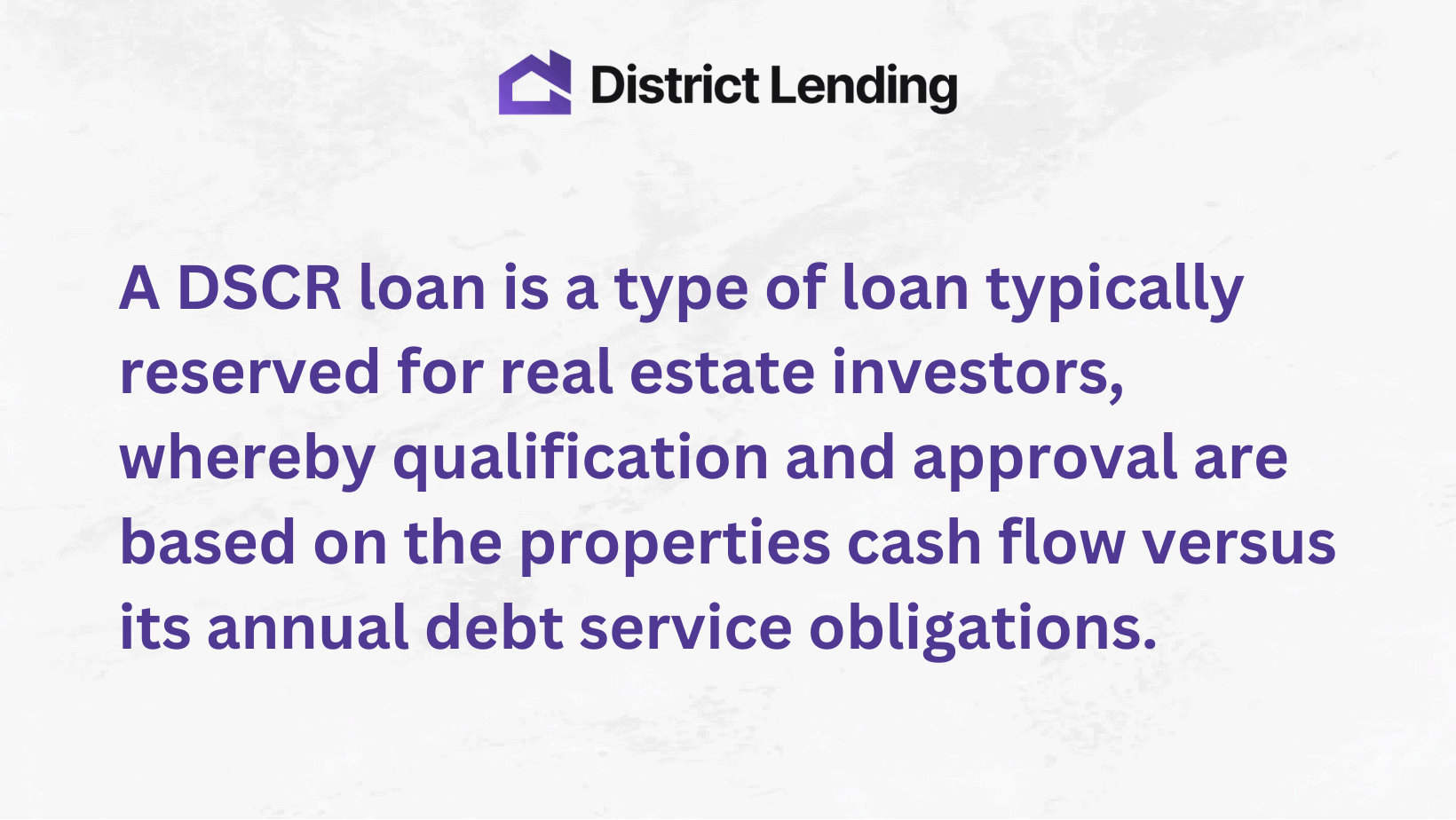Dscr loan Arizona is a type of financing that focuses on the property’s debt service coverage ratio. This loan is commonly used by commercial real estate investors in Arizona to assess their ability to cover loan payments.
When seeking a Dscr loan in Arizona, understanding the intricacies of this financing option is crucial for a successful borrowing experience. By delving deeper into how Dscr loans work and their specific requirements, borrowers can make informed decisions that align with their financial goals.
In this blog post, we will explore the key aspects of Dscr loans in Arizona, highlighting the benefits, eligibility criteria, and application process. Whether you are a seasoned investor or a newcomer to the commercial real estate industry, this information will serve as a valuable guide to navigating the world of Dscr loans in Arizona.

Credit: districtlending.com
Introduction To Dscr Loans In Arizona
When it comes to real estate financing in Arizona, DSCR loans have gained traction as a popular option for investors and property owners. Understanding the basics of DSCR loans is essential for anyone looking to navigate the Arizona real estate market.
What Is A Dscr Loan?
A Debt-Service Coverage Ratio (DSCR) loan is a type of commercial real estate loan that evaluates the property’s ability to generate income to cover its debt obligations. Lenders assess the property’s DSCR to determine the loan amount and interest rates, making it a crucial factor in securing financing for income-generating properties.
Popularity In The Arizona Real Estate Market
DSCR loans have seen a surge in popularity within the Arizona real estate market due to their flexibility and favorable terms for investors. With a strong focus on the property’s income potential, these loans offer an attractive option for financing various real estate ventures, from rental properties to commercial developments.

Credit: www.jvmlending.com
Eligibility Criteria For Dscr Loans
When considering a DSCR loan in Arizona, understanding the eligibility criteria is crucial. The Debt Service Coverage Ratio (DSCR) is a key factor in determining eligibility, along with credit score requirements and property type considerations. Let’s delve into the specifics of each criterion to gain a comprehensive understanding of the eligibility requirements for DSCR loans.
Minimum Dscr Ratio
The minimum DSCR ratio required for a DSCR loan in Arizona typically falls in the range of 1.20 to 1.35. This means that the property’s net operating income must be at least 20% to 35% higher than the property’s annual debt service. Lenders prefer a higher DSCR ratio as it indicates stronger cash flow to cover debt obligations.
Credit Score Requirements
For DSCR loans in Arizona, borrowers are generally expected to have a minimum credit score of 620. However, a higher credit score, ideally above 700, can significantly enhance the chances of approval and may even lead to more favorable loan terms. Lenders assess credit scores to evaluate an individual’s creditworthiness and ability to manage debt responsibly.
Property Type Considerations
When it comes to property type considerations, lenders typically favor commercial properties such as office buildings, retail spaces, and multifamily residences for DSCR loans in Arizona. These properties generate consistent income, making them more attractive to lenders. Additionally, properties with a strong rental history and stable occupancy rates are viewed more favorably.
Benefits Of Dscr Loans For Investors
DSCR loans in Arizona do not require personal income verification for approval, making it easier for investors.
Investors have the flexibility to use DSCR loans for various types of property investments, providing versatility.
With DSCR loans, investors have the potential to achieve higher returns on their investments due to favorable terms.
Comparing Dscr Loans To Traditional Mortgages
Key Differences
DSCR loans and traditional mortgages differ in several key aspects, including their eligibility requirements, underwriting process, and intended use.
Pros And Cons Of Each Loan Type
Both DSCR loans and traditional mortgages come with their own set of advantages and disadvantages, making it crucial for borrowers to carefully evaluate their individual financial needs and goals.
Steps To Apply For A Dscr Loan In Arizona
When seeking a DSCR (Debt Service Coverage Ratio) loan in Arizona, it’s essential to understand the application process and the necessary steps involved. Here’s a comprehensive guide to help you navigate through the process with ease.
Gathering Necessary Documentation
Before applying for a DSCR loan in Arizona, it’s crucial to gather all the required documentation. This includes financial statements, tax returns, property information, business plans, and any other relevant records that demonstrate your financial stability and ability to repay the loan.
Finding The Right Lender
Choosing the right lender is a critical step in securing a DSCR loan. Look for lenders experienced in providing DSCR loans in Arizona, and those who understand the local market dynamics. Research different lenders to find one that offers favorable terms and has a track record of supporting businesses similar to yours.
Loan Application Process
Once you have gathered all the necessary documentation and identified a suitable lender, the next step is to initiate the loan application process. This typically involves submitting your financial records, completing the application form, and undergoing a comprehensive credit assessment. After the lender reviews your application, they will provide you with the terms and conditions of the loan.
Financial Metrics Important For Dscr Loans
When considering DSCR loans in Arizona, understanding the Financial Metrics Important for DSCR Loans is crucial. Two key financial metrics that play a significant role in the approval process are the Debt Service Coverage Ratio (DSCR) and Rental Income Analysis.
Calculating Debt Service Coverage Ratio
The Debt Service Coverage Ratio (DSCR) is a simple calculation used by lenders to assess a borrower’s ability to cover their debt obligations. It is calculated by dividing the property’s net operating income by the total debt service.
Importance Of Rental Income Analysis
Rental income analysis is essential as it provides insight into the property’s cash flow stability and ability to generate consistent income. Lenders evaluate the rental income to ensure it can cover the property’s expenses and debt service.
Case Studies: Successful Dscr Loan Investments
Single-family Rental Success
One compelling case study of a successful DSCR loan investment in Arizona involved a single-family rental property. The investor utilized a DSCR loan to finance the acquisition of the property, allowing for a substantial increase in cash flow. This investment strategy enabled the investor to capitalize on the high demand for single-family rentals in the Arizona market, resulting in consistent and lucrative returns. Through the strategic utilization of DSCR loan, the investor achieved remarkable success in the single-family rental segment.
Multi-unit Property Investment
Another noteworthy case study highlights the success of a DSCR loan investment in a multi-unit property in Arizona. The investor leveraged the DSCR loan to secure funding for the acquisition and renovation of a multi-unit property, leading to a significant increase in property value and rental income. By utilizing the DSCR loan to optimize the property’s financial performance, the investor successfully maximized the return on investment and established a strong foothold in the thriving Arizona real estate market.

Credit: www.jvmlending.com
Future Of Dscr Loans In Arizona’s Market
The future of DSCR loans in Arizona’s market is poised for significant growth and evolution. With the changing economic landscape and emerging trends, it’s essential to understand the trajectory of DSCR loans and their impact on the Arizona market.
Trends And Predictions
In the coming years, DSCR loans in Arizona are expected to witness a surge in demand as more investors and business owners seek financing solutions with favorable debt service coverage ratios. The trend towards non-traditional lenders and alternative financing options is likely to continue, offering borrowers more flexibility and accessibility.
Impact Of Economic Changes
The economic changes in Arizona will play a pivotal role in shaping the future of DSCR loans. As the market adapts to shifts in interest rates, inflation, and overall economic stability, borrowers and lenders alike will need to navigate these changes to ensure sustainable and viable financing options.
Frequently Asked Questions
How Much Do You Need Down For A Dscr Loan?
The down payment for a DSCR loan varies depending on the lender and the specific loan. Generally, lenders require a down payment of 20% to 25% of the total loan amount. However, some lenders may require a higher down payment depending on the borrower’s creditworthiness and the property’s cash flow.
It’s important to shop around and compare offers from different lenders to find the best terms for your situation.
Who Qualifies For A Dscr Loan?
Individuals with strong income and credit history qualify for a DSCR loan based on their debt-service coverage ratio.
What Are The Downsides Of A Dscr Loan?
The downsides of a DSCR loan include higher interest rates, stricter qualification criteria, and potential risk of property seizure.
What Is A Dscr Loan In Arizona?
A DSCR loan in Arizona calculates income to debt ratio for commercial property financing.
Conclusion
Dscr loans in Arizona provide vital financial support for businesses. With flexible terms and rates, they are a valuable resource for growth. Understanding the nuances of Dscr loans is essential for making informed decisions. Consult with experts to maximize benefits and propel your business forward.
